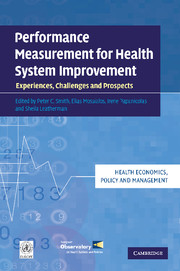Book contents
- Frontmatter
- Contents
- Foreword
- Acknowledgements
- List of contributors
- List of boxes, figures and tables
- Part I Principles of performance measurement
- 1.1 Introduction
- Part II Dimensions of performance
- Part III Analytical methodology for performance measurement
- Part IV Performance measurement in specific domains
- Part V Health policy and performance measurement
- Part VI Conclusions
- Index
1.1 - Introduction
Published online by Cambridge University Press: 06 July 2010
- Frontmatter
- Contents
- Foreword
- Acknowledgements
- List of contributors
- List of boxes, figures and tables
- Part I Principles of performance measurement
- 1.1 Introduction
- Part II Dimensions of performance
- Part III Analytical methodology for performance measurement
- Part IV Performance measurement in specific domains
- Part V Health policy and performance measurement
- Part VI Conclusions
- Index
Summary
Introduction
Information plays a central role in a health system's ability to secure improved health for its population. Its many and diverse uses include tracking public health; determining and implementing appropriate treatment paths for patients; supporting clinical improvement; monitoring the safety of the health-care system; assuring managerial control; and promoting health system accountability to citizens. However, underlying all of these efforts is the role that information plays in enhancing decision-making by various stakeholders (patients, clinicians, managers, governments, citizens) seeking to steer a health system towards the achievement of better outcomes.
Records of performance measurement efforts in health systems can be traced back at least 250 years (Loeb 2004; McIntyre et al. 2001). More formal arguments for the collection and publication of performance information were developed over 100 years ago. Pioneers in the field campaigned for its widespread use in health care but were impeded by professional, practical and political barriers (Spiegelhalter 1999). For example, Florence Nightingale and Ernest Codman's efforts were frustrated by professional resistance and until recently information systems have failed to deliver their promised benefits in the form of timely, accurate and useful information.
Nevertheless, over the past twenty-five years there has been a dramatic growth in health system performance measurement and reporting. Many factors have contributed to this growth.
- Type
- Chapter
- Information
- Performance Measurement for Health System ImprovementExperiences, Challenges and Prospects, pp. 3 - 24Publisher: Cambridge University PressPrint publication year: 2010
- 6
- Cited by



